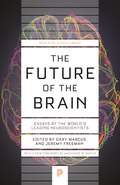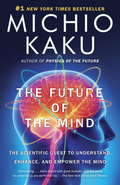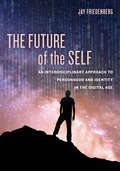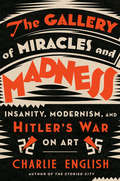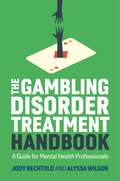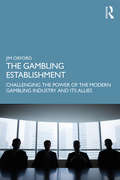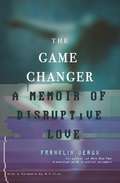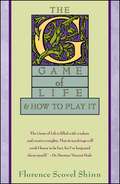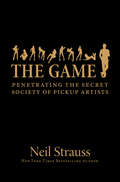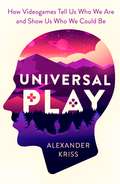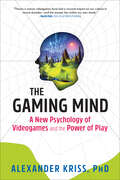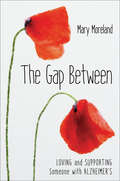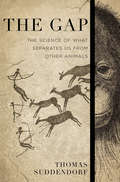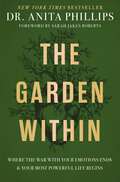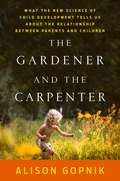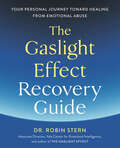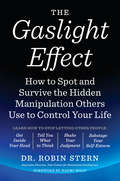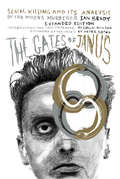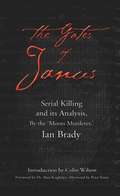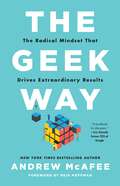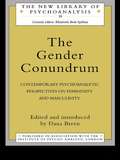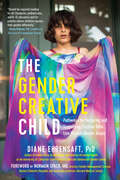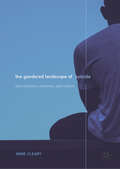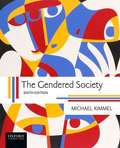- Table View
- List View
The Future of the Brain: Essays by the World's Leading Neuroscientists (Princeton Science Library #146)
by Gary Marcus and Jeremy FreemanThe world's top experts take readers to the very frontiers of brain scienceIncludes a chapter by 2014 Nobel laureates May-Britt Moser and Edvard MoserAn unprecedented look at the quest to unravel the mysteries of the human brain, The Future of the Brain takes readers to the absolute frontiers of science. Original essays by leading researchers such as Christof Koch, George Church, Olaf Sporns, and May-Britt and Edvard Moser describe the spectacular technological advances that will enable us to map the more than eighty-five billion neurons in the brain, as well as the challenges that lie ahead in understanding the anticipated deluge of data and the prospects for building working simulations of the human brain. A must-read for anyone trying to understand ambitious new research programs such as the Obama administration's BRAIN Initiative and the European Union's Human Brain Project, The Future of the Brain sheds light on the breathtaking implications of brain science for medicine, psychiatry, and even human consciousness itself.Contributors include: Misha Ahrens, Ned Block, Matteo Carandini, George Church, John Donoghue, Chris Eliasmith, Simon Fisher, Mike Hawrylycz, Sean Hill, Christof Koch, Leah Krubitzer, Michel Maharbiz, Kevin Mitchell, Edvard Moser, May-Britt Moser, David Poeppel, Krishna Shenoy, Olaf Sporns, Anthony Zador.
The Future of the Mind: The Scientific Quest to Understand, Enhance, and Empower the Mind
by Michio Kaku#1 NEW YORK TIMES BESTSELLER • The renowned theoretical physicist and national bestselling author of The God Equation tackles the most fascinating and complex object in the known universe: the human brain.&“Compelling…Kaku thinks with great breadth, and the vistas he presents us are worth the trip.&” —The New York Times Book ReviewThe Future of the Mind brings a topic that once belonged solely to the province of science fiction into a startling new reality. This scientific tour de force unveils the astonishing research being done in top laboratories around the world—all based on the latest advancements in neuroscience and physics—including recent experiments in telepathy, mind control, avatars, telekinesis, and recording memories and dreams. The Future of the Mind is an extraordinary, mind-boggling exploration of the frontiers of neuroscience. Dr. Kaku looks toward the day when we may achieve the ability to upload the human brain to a computer, neuron for neuron; project thoughts and emotions around the world on a brain-net; take a &“smart pill&” to enhance cognition; send our consciousness across the universe; and push the very limits of immortality.
The Future of the Self: An Interdisciplinary Approach to Personhood and Identity in the Digital Age
by Jay FriedenbergWe live in the digital age where our sense of self and identity has moved beyond the body to encompass hardware and software. Cyborgs, online representations in social media, avatars, and virtual reality extend our notion of what it means to be human. This book looks at the progression of self from the biological to the technological using a multidisciplinary approach. It examines the notion of personhood from philosophical, psychological, neuroscience, robotics, and artificial intelligence perspectives, showing how the interface between bodies, brains, and technology can give rise to new forms of human identity. Jay Friedenberg presents the content in an organized and easy-to-understand fashion to facilitate learning. A gifted researcher, author, and classroom teacher, he is one of the most influential voices in the field of artificial psychology.
The Gallery of Miracles and Madness: Insanity, Modernism, and Hitler's War on Art
by Charlie EnglishThe untold story of Hitler&’s war on &“degenerate&” artists and the mentally ill that served as a model for the &‘Final Solution&’. &“Dazzling . . . Richly wrought and deeply researched, it&’s also a salient reminder to beware of pseudoscience.&”—Susannah Cahalan, author of Brain on Fire and The Great Pretender As a veteran of the First World War, and an expert in art history and medicine, Hans Prinzhorn was uniquely placed to explore the connection between art and madness. The work he collected—ranging from expressive paintings to life-size rag dolls and fragile sculptures made from chewed bread—contained a raw, emotional power, and the book he published about the material inspired a new generation of modern artists, Max Ernst, André Breton, and Salvador Dalí among them. By the mid-1930s, however, Prinzhorn&’s collection had begun to attract the attention of a far more sinister group. Modernism was in full swing when Adolf Hitler arrived in Vienna in 1907, hoping to forge a career as a painter. Rejected from art school, this troubled young man became convinced that modern art was degrading the Aryan soul, and once he had risen to power he ordered that modern works be seized and publicly shamed in &“degenerate art&” exhibitions, which became wildly popular. But this culture war was a mere curtain-raiser for Hitler&’s next campaign, against allegedly &“degenerate&” humans, and Prinzhorn&’s artist-patients were caught up in both. By 1941, the Nazis had murdered 70,000 psychiatric patients in killing centers that would serve as prototypes for the death camps of the Final Solution. Dozens of Prinzhorn artists were among the victims. The Gallery of Miracles and Madness is a spellbinding, emotionally resonant tale of this complex and troubling history that uncovers Hitler&’s wars on modern art and the mentally ill and how they paved the way for the Holocaust. Charlie English tells an eerie story of genius, madness, and dehumanization that offers readers a fresh perspective on the brutal ideology of the Nazi regime.
The Gambling Disorder Treatment Handbook: A Guide for Mental Health Professionals
by Jody Bechtold Alyssa WilsonThis handbook provides mental health professionals with a thorough understanding of the biopsychosocial nature of disordered gambling and shares current evidence-based theories, interventions and strategies to use in clinical practice. It provides guidance for working with individuals of any age and covers different gambling modes, activities and subtypes, including new forms of gambling through online and virtual platforms. Drawing on the authors' substantial experience working with and researching gambling addiction, it considers how treatment can be specialized for particular client groups, including trauma survivors, military, older adults, adolescents and diverse communities. It provides detailed diagnostic and screening resources and includes important information on the financial and legal aspects.This is essential reading for any therapist treating clients with gambling disorder.
The Gambling Establishment: Challenging the Power of the Modern Gambling Industry and its Allies
by Jim OrfordThere are now signs that, after decades of phenomenal growth, the era of unrestrained gambling liberalisation may be coming to an end. However, the power of the Gambling Establishment is formidable, and it will certainly fight back. Drawing on research and policy examples from around the world, the book provides a unified understanding of the dangerousness of modern commercialised gambling, how its expansion has been deliberately or inadvertently supported, and how the backlash is now occurring. The term Gambling Establishment is defined to include the industry which sells gambling, governments which support it, and a wider network of organisations and individuals who have subscribed to the ‘responsible gambling’ Establishment discourse. Topics covered include the psychology of how gambling is now being advertised and promoted and the way it is designed to deceive gamblers about their chances of winning; the increased exposure of young people to gambling and the alignment of gambling with sport; understanding the experience of gambling addiction; the various public health harms of gambling at individual, family, community and societal levels; and how evidence has been used to resist change. The book’s final chapter offers the author’s manifesto for policy change, designed with Britain particularly in mind but likely to have relevance elsewhere. With detailed examples given of the ways a number of countries are responding to these threats to their citizens’ health, this book will be of global interest for academics, researchers, policymakers and service providers in the field of gambling or other addictions specifically, and public health and social policy generally.
The Game Changer: A Memoir of Disruptive Love
by Franklin VeauxTo make an open marriage work, Franklin and Celeste knew they needed to make sure no one else ever came between them. That meant there had to be rules. No overnights, no falling in love, and either one of them could ask the other to end an outside relationship if it became too much to deal with. It worked for nearly two decades--and their relentless focus on their own relationship let them turn a blind eye to the emotional wreckage they were leaving behind them. The rules did not prepare them for Amber. "I have a question," Amber would say. And whatever came next would send a wrecking ball through Franklin and Celeste's comforting illusions. Amber was the first of Franklin's polyamorous secondary partners to insist on being treated like a person, and the first to peel back the layers of insecurity and fear that surrounded their relationship. Amber was a game changer. A game-changing relationship is one that uproots and redirects your life. It overthrows your assumptions about who you are and why. It awakens you to possibilities you'd never conceived of. It disrupts. And it is the unspoken elephant in the attractive showroom of polyamorous relationships. This book is the true story of a game-changing relationship that changed not only Franklin and Celeste's lives, but the face of the modern polyamory movement. A game-changing relationship can happen to anyone. How will you handle it when it happens to you?
The Game of Life
by Florence Scovel ShinnThis book will open your mind and renew your life! The late Florence Scovel Shinn, artist, metaphysician, and lecturer, left us with this beautiful and inspiring book brimming with precious brimming with the power of the word and the precions knowledge of the laws of perfect self-expression, and intuition. Her enlightening words and basic principles will teach you to turn defeat into victory...lack into prosperity...fear into faith...and resentment into love. Learn how to use the power of your thought, and make life a "winning game" -- not a losing battle.
The Game: Penetrating the Secret Society of Pickup Artists
by Neil StraussHidden somewhere, in nearly every major city in the world, is an underground seduction lair. And in these lairs, men trade the most devastatingly effective techniques ever invented to charm women. This is not fiction. These men really exist. <P><P>They live together in houses known as Projects. And Neil Strauss, the bestselling author and journalist, spent two years living among them, using the pseudonym Style to protect his real-life identity. The result is one of the most explosive and controversial books of the last decade--guaranteed to change the lives of men and transform the way women understand the opposite sex forever.On his journey from AFC (average frustrated chump) to PUA (pick-up artist) to PUG (pick-up guru), Strauss not only shares scores of original seduction techniques but also has unforgettable encounters with the likes of Tom Cruise, Britney Spears, Paris Hilton, Heidi Fleiss, and Courtney Love. And then things really start to get strange--and passions lead to betrayals lead to violence. The Game is the story of one man's transformation from frog to prince to prisoner in the most unforgettable book of this generation.
The Gaming Mind: A New Psychology of Videogames and the Power of Play
by Alexander KrissEven as the popularity of videogames has skyrocketed, a dark cloud continues to hang over them. Many people who play games feel embarrassed to admit as much, and many who don't worry about the long-term effects of a medium often portrayed as dangerous and corruptive.Drawing on years of experience working directly with people who play games, clinical psychologist Alexander Kriss steers the discourse away from extreme and factually inaccurate claims around the role of games in addiction, violence and mental illness, instead focusing on the importance of understanding the unique relationship that forms between a game and its player.Through vivid psychotherapy case illustrations, autobiographical memoir, and a wide range of psychological theory and research, The Gaming Mind lays out an honest and humanistic vision of games, their potentials and risks, and how they can teach us more about who we are and who we could be.
The Gaming Mind: A New Psychology of Videogames and the Power of Play
by Alexander KrissAre videogames bad for us? It’s the question on everyone’s mind, given teenagers’ captive attention to videogames and the media’s tendency to scapegoat them. It’s also—if you ask clinical psychologist Alexander Kriss—the wrong question. In his therapy office, Kriss looks at videogames as a window into the mind. Is his patient Liz really “addicted” to Candy Crush—or is she evading a deeper problem? Why would aspiring model Patricia craft a hideous avatar named “Pat”? And when Jack immerses himself in Mass Effect, is he eroding his social skills—or honing them via relationship-building gameplay? Weaving together Kriss’s personal history, patients’ experiences, and professional insight—and without shying away from complex subjects, such as online harassment—The Gaming Mind disrupts our assumptions about “gamers” and explores how gaming can be good for us. It offers guidance for parents, clinicians, and the rest of us to better understand the gaming mind. Like any mode of play, at their best, videogames reveal who we are—and what we want from our lives.
The Gandhian Moment
by Ramin JahanbeglooGandhi is revered as a historic leader, the father of Indian independence, and the inspiration for nonviolent protest around the world. But the importance of these practical achievements has obscured Gandhi’s stature as an extraordinarily innovative political thinker. Ramin Jahanbegloo presents Gandhi the political theorist-the intellectual founder of a system predicated on the power of nonviolence to challenge state sovereignty and domination. A philosopher and an activist in his own right, Jahanbegloo guides us through Gandhi’s core ideas, shows how they shaped political protest from 1960s America to the fall of the Berlin Wall and beyond, and calls for their use today by Muslims demanding change. Gandhi challenged mainstream political ideas most forcefully on sovereignty. He argued that state power is not legitimate simply when it commands general support or because it protects us from anarchy. Instead, legitimacy depends on the consent of dutiful citizens willing to challenge the state nonviolently when it acts immorally. The culmination of the inner struggle to recognize one’s duty to act, Jahanbegloo says, is the ultimate “Gandhian moment. ” Gandhi’s ideas have motivated such famous figures as Martin Luther King, Nelson Mandela, and the Dalai Lama. As Jahanbegloo demonstrates, they also inspired the unheralded Muslim activists Abul Kalam Azad and Khan Abdul Ghaffar Khan, whose work for Indian independence answers those today who doubt the viability of nonviolent Islamic protest. The book is a powerful reminder of Gandhi’s enduring political relevance and a pioneering account of his extraordinary intellectual achievements.
The Gap Between: Loving and Supporting Someone with Alzheimer's
by Mary MorelandOne woman shares her emotional experience navigating her parents&’ declining health, culminating in her mother&’s years-long struggle with Alzheimer&’s. Mary Moreland details her journey through the stages of grief as she comes to terms with her father&’s death, followed by her mother&’s Alzheimer&’s diagnosis. As her mother&’s disease progresses over eight years, Mary walks readers through the earliest phase and all the way to her mother&’s deathbed. She provides insightful advice on grieving and caring for loved ones with dementia or Alzheimer&’s, alongside her own story of loss.
The Gap: The Science of What Separates Us from Other Animals
by Thomas SuddendorfThere exists an undeniable chasm between the capacities of humans and those of animals, but what exactly is the difference between our minds and theirs? In "The Gap," psychologist Thomas Suddendorf provides a definitive account of what makes human minds unique and how this disparity arose. He proposes that two innovations account for all of the ways in which our minds appear so distinct: our open-ended ability to imagine and reflect, and our insatiable drive to link our minds together. It is not language or morality that set us apart, but the ability to consider a range of scenarios, real and imagined, past and future. A provocative argument for reconsidering our place in nature, "The Gap" is essential reading for anyone interested in our evolutionary origins and our relationship with the rest of the animal kingdom.
The Garden Within: Where the War with Your Emotions Ends and Your Most Powerful Life Begins
by Dr. Anita PhillipsNEW YORK TIMES BESTSELLER | WALL STREET JOURNAL BESTSELLERToo often we&’ve been taught to view our emotions with suspicion, seeing them as something to be suppressed, managed, or mastered. This isn&’t true. Emotions are not your enemy. Internal war is not your destiny. You were created to flourish. In this game-changing book, trauma therapist and mental health expert Dr. Anita Phillips reveals how embracing emotion is the key to living your most powerful life. Just as gardens thrive in good ground, the abundant life you&’ve been seeking can only be grown in the soil of your heart.Blending faith, the latest discoveries in neurobiology, and her own research and work as a licensed therapist, Dr. Anita shows you how to cultivate a state of emotional well-being that can: strengthen your body and reverse the effects of trauma,calm anxiety and renew your mind, andunleash a new level of spiritual power in your life.This book will equip you with the tools you need to nurture a part of yourself that has been misunderstood for too long — your heart — setting you free to live just as the Creator intended. AUTHENTIC. FRUITFUL. POWERFUL
The Gardener And The Carpenter: What The New Science Of Child Development Tells Us About The Relationship Between Parents And Children
by Alison GopnikOne of the world's leading child psychologists shatters the myth of "good parenting" Caring deeply about our children is part of what makes us human. Yet the thing we call "parenting" is a surprisingly new invention. In the past thirty years, the concept of parenting and the multibillion dollar industry surrounding it have transformed child care into obsessive, controlling, and goal-oriented labor intended to create a particular kind of child and therefore a particular kind of adult. In The Gardener and the Carpenter, the pioneering developmental psychologist and philosopher Alison Gopnik argues that the familiar twenty-first-century picture of parents and children is profoundly wrong--it's not just based on bad science, it's bad for kids and parents, too. Drawing on the study of human evolution and her own cutting-edge scientific research into how children learn, Gopnik shows that although caring for children is profoundly important, it is not a matter of shaping them to turn out a particular way. Children are designed to be messy and unpredictable, playful and imaginative, and to be very different both from their parents and from each other. The variability and flexibility of childhood lets them innovate, create, and survive in an unpredictable world. “Parenting" won't make children learn—but caring parents let children learn by creating a secure, loving environment.
The Gaslight Effect Recovery Guide: Your Personal Journey Toward Healing from Emotional Abuse
by Dr. Robin SternThis informative guided journal helps victims of gaslighting understand the dynamics of challenging and unhealthy relationships—and how to leave one—from the author of The Gaslight Effect.In 2007, Dr. Robin Stern coined the phrase "gaslight effect" to explain the long-term effects of repeated gaslighting: an insidious and sometimes covert form of emotional abuse in which a gaslighter undermines and controls another person by deflecting, twisting, and denying their reality. Gaslighting can happen in a romantic relationship, between family members, or at work—but in every case, it leaves you constantly second-guessing yourself, unable to make simple decisions, and destabilized from the constant reality shifts.The Gaslight Effect Recovery Guide is a tool for personal exploration that will help you identify if you are part of a pattern of emotional abuse and pull yourself out of that dynamic with a few crucial mindset shifts. Through prompts, checklists, quizzes, and guided reflective questions, you will explore past and present relationships, gain the confidence to leave an abusive partner or set boundaries in an unavoidable situation, and heal after gaslighting. This interactive workbook will help you:Name the Gaslight Effect and identify abuse in any relationship.Heal a relationship or free yourself from a gaslighting dynamic.Learn what makes you vulnerable to gaslighting.Deepen your self-awareness and self-compassion.Expand your capacity to trust yourself and reach out to others for support.The Gaslight Effect Recovery Guide will help you reveal the truth behind gaslighting interactions, allowing you to cultivate happy, healthy relationships and regain your joy, creativity, and sense of self.
The Gaslight Effect: How To Spot And Survive The Hidden Manipulation Others Use To Control Your Life
by Robin SternAre You Being Gaslighted? Your husband crosses the line in his flirtations with another woman at a dinner party. When you confront him, he asks you to stop being insecure and controlling. After a long argument, you apologize for giving him a hard time. Your boss backed you on a project when you met privately in his office, and you went full steam ahead. But at a large gathering of staff--including yours--he suddenly changes his tune and publicly criticizes your poor judgment. When you tell him your concerns for how this will affect your authority, he tells you that the project was ill-conceived and you'll have to be more careful in the future. You begin to question your competence. Your mother belittles your clothes, your job, your friends, and your boyfriend. But instead of fighting back as your friends encourage you to do, you tell them that your mother is often right and that a mature person should be able to take a little criticism. If you think things like this can't happen to you, think again. Gaslighting is when someone wants you to do what you know you shouldn't and to believe the unbelievable. It can happen to you and it probably already has. How do we know? If you consider answering "yes" to even one of the following questions, you've probably been gaslighted:Does your opinion of yourself change according to approval or disapproval from your spouse? When your boss praises you, do you feel as if you could conquer the world? Do you dread having small things go wrong at home--buying the wrong brand of toothpaste, not having dinner ready on time, a mistaken appointment written on the calendar? Gaslighting is an insidious form of emotional abuse and manipulation that is difficult to recognize and even harder to break free from. That's because it plays into one of our worst fears--of being abandoned--and many of our deepest needs: to be understood, appreciated, and loved. In this groundbreaking guide, the prominent therapist Dr. Robin Stern shows how the Gaslight Effect works and tells you how to: Turn up your Gaslight Radar, so you know when a relationship is headed for trouble; Determine whether you are enabling a gaslighter; Recognize the Three Stages of Gaslighting: Disbelief, Defense, and Depression; Refuse to be gaslighted by using the Five Rules for Turning Off the Gas; Develop your own "Gaslight Barometer" so you can decide which relationships can be saved--and which you have to walk away from; Learn how to Gasproof Your Life so that you'll never again choose another gaslighting relationship because it plays into one of our worst fears--of being abandoned--and many of our deepest needs: to be understood, appreciated, and loved.
The Gates of Janus
by Colin Wilson Ian Brady Peter SotosIan Brady and Myra Hindley's spree of torture, sexual abuse, and murder of children in the 1960s was one of the most appalling series of crimes ever committed in England, and remains almost daily fixated upon by the tabloid press. In The Gates of Janus, Ian Brady himself allows us a glimpse into the mind of a murderer as he analyzes a dozen other serial crimes and killers.Criminal profiling by a criminal was not invented by the dramatists of Dexter.Novelist and true-crime writer Colin Wilson, author of the famous and influential book The Outsider, remarks in his introduction to Brady's book that one must first explore the depraved reaches of human consciousness to truly understand human character.When first released in 2001, The Gates of Janus sparked controversy attended by a huge media splash. The new edition, the first in paperback, provides the reader with a decade and a half of updates, including Brady's letters to the publisher, both providing information regarding his own demented history along with demands that Feral House remove its unflattering afterword written by author Peter Sotos.
The Gates of Janus
by Ian BradyThe Moors Murderer of 1960s Britain analyzes and explores a series of serial killersincluding himself.
The Geek Way: The Radical Mindset that Drives Extraordinary Results
by Andrew McAfeeThe Economist's Best Books of 2023 Forbes Top 10 Business Books of 2023Financial Times' Monthly Best Business Books to Read Pick In this "handbook for disruptors" (Eric Schmidt), The Geek Way reveals a new way to get big things done. It will change the way you think about work, teams, projects, and culture, and give you the insight and tools you need to harness our human superpowers of learning and cooperation. What is &“being geeky?&” It&’s being a perennially curious person, one who's not afraid to tackle hard problems and embrace unconventional solutions. McAfee shows how the geeks have created a new culture based around four norms: science, ownership, speed, and openness. The geek way seems odd at first. It's not deferential to experts, fond of planning and process, afraid of mistakes, or obsessed with "winning." But it explains everything from why Montessori babies turn out to be creative tinkerers to how newcomers are disrupting industry after industry (and still just getting started). When all four norms are in place, a culture emerges that is freewheeling, fast-moving, egalitarian, evidence-driven, argumentative, and autonomous. Why does the geek way work so much better? McAfee provides an original answer: because it taps into humanity's superpower, which is our ability to cooperate intensely and learn rapidly. By providing insights from the young discipline of cultural evolution, McAfee shows that when we come together under the right conditions, we quickly figure out how to build reusable spaceships and self-correcting organizations. Under the wrong conditions, though, we create bureaucracy, chronic delays, cultures of silence, and the other classic dysfunctions of the Industrial Era. Mixing cutting-edge science, history, analysis, and stories that show the geek way in action, McAfee offers a new way to see the world and empowering tools for seizing the big opportunities of today and tomorrow.
The Gender Conundrum: Contemporary Psychoanalytic Perspectives on Femininity and Masculinity (The New Library of Psychoanalysis #No. 18)
by Dana BreenIn The Gender Conundrum Dana Birksted-Breen brings together for the first time key psychoanalytic papers on the subject of femininity and masculinity from the very different British, French, and American perspectives. The papers are gathered around the central issue of the interplay of body and psyche in psychoanalysis. The editor sees the positive use of this given tension and duality as the key to real understanding of the questions currently surrounding gender identity. As well as addressing the outspoken controversy over the understanding of femininity, she shows that there has been a more silent revolution in the understanding of masculinity. Offering an international perspective, this collection of seminal papers with introductions of exemplary clarity fills a considerable gap in the literature, providing a classic text for psychoanalysis and gender studies.
The Gender Creative Child: Pathways For Nurturing And Supporting Children Who Live Outside Gender Boxes
by Diane EhrensaftFrom a leading US authority on a subject more timely than ever—an up-to-date, all-in-one resource on gender-nonconforming children and adolescents In her groundbreaking first book, Gender Born, Gender Made, Dr. Diane Ehrensaft coined the term gender creative to describe children whose unique gender expression or sense of identity is not defined by a checkbox on their birth certificate. Now, with The Gender Creative Child, she returns to guide parents and professionals through the rapidly changing cultural, medical, and legal landscape of gender and identity. In this up-to-date, comprehensive resource, Dr. Ehrensaft explains the interconnected effects of biology, nurture, and culture to explore why gender can be fluid, rather than binary. As an advocate for the gender affirmative model and with the expertise she has gained over three decades of pioneering work with children and families, she encourages caregivers to listen to each child, learn their particular needs, and support their quest for a true gender self. The Gender Creative Child unlocks the door to a gender-expansive world, revealing pathways for positive change in our schools, our communities, and the world.
The Gendered Landscape of Suicide: Masculinities, Emotions, and Culture
by Anne ClearyThis book is an attempt to understand suicide from the perspective of a group of men who decided to take their own lives. Their stories imply that male suicide is not, as frequently portrayed, an impulsive action arising from particular, sex-specific, causes but relates to a cluster of interlinked issues which accumulate over time. These issues were not distinctively male concerns but were connected to gender in that the men’s difficulties were exacerbated by the existence of an emotional culture which inhibited males from expressing specific feelings. The prevailing form of masculinity impeded them in developing knowledge of, and speaking about, their emotional needs and from accessing help and this prolonged their suffering and made suicide a possibility. These men produced compelling accounts of their emotional pain which belied notions of male inexpressiveness but the findings point to a link between emotionally constraining cultures and suicidal behaviour for some groups of men.
The Gendered Society
by Michael KimmelThe sixth edition of The Gendered Society explores current thinking about gender, both inside academia and in our everyday lives. Michael Kimmel challenges the claim that gender is limited to women's experiences--his compelling and balanced study of gender includes both masculine and feminine perspectives. Kimmel makes three bold and persuasive statements about gender. First, he demonstrates that gender differences are often extremely exaggerated; in fact, he argues that men and women have much more in common than we think they do. Kimmel also challenges the pop psychologists who suggest that gender difference is the cause of inequality between the sexes; instead, he reveals that the reverse is true-gender inequality itself is the cause of the differences between men and women. Finally, he illustrates that gender is not merely an element of individual identity, but a socially constructed institutional phenomenon.
